In the Rehearsal Room with Don Was
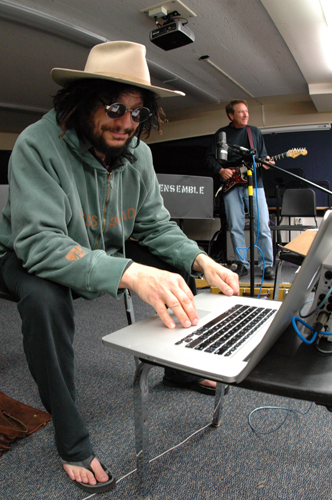
Don Was uses his laptop to record rehearsal in Berklee ensemble room B-16.
Photo Adam Olenn
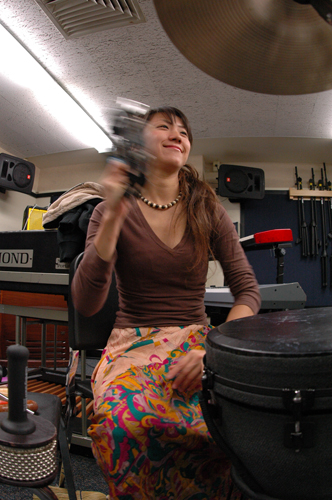
Percussionist Noriko Terada shakes the tambourine.
Photo Adam Olenn
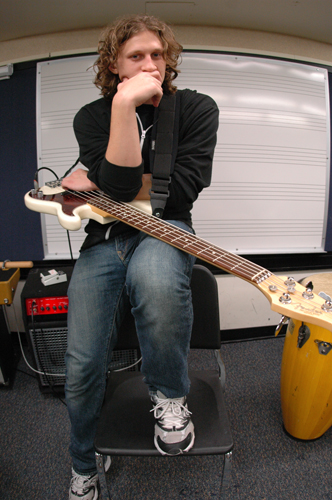
Bassist Jon Kolar, caught in a contemplative moment, is an 8th semester performance major.
Photo Adam Olenn
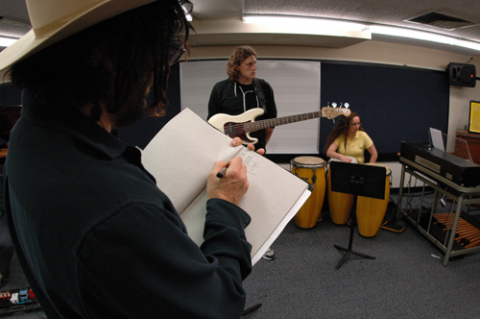
Don Was sketches out the form of a song.
Photo Adam Olenn
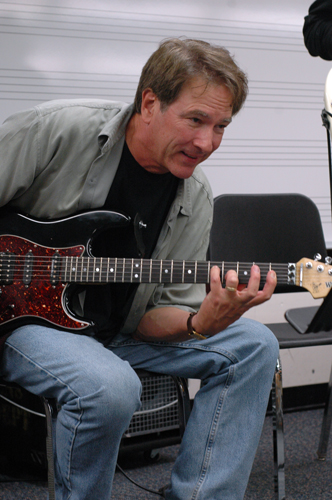
Marty Walsh, assistant professor of ensembles, also teaches music production classes.
Photo Adam Olenn
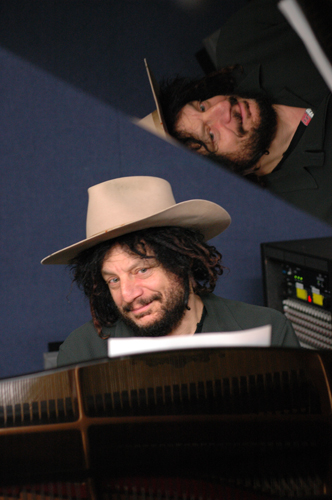
Left to right: Was, not Was.
Photo Adam Olenn
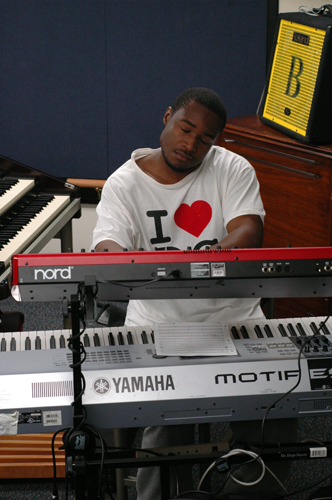
Student drummer Darek Cobbs puts his heart in the song.
Photo Adam Olenn

Student guitarist "Johnny Duke" Lippincott leads his own blues band when he's not playing with Grammy-winning producers.
Photo Adam Olenn
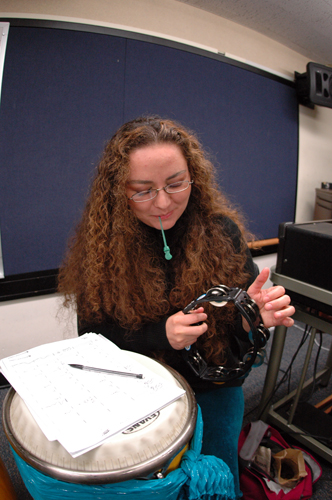
Mexico-born percussionist Judith Soberanes Castanon plans her moves.
Photo Adam Olenn
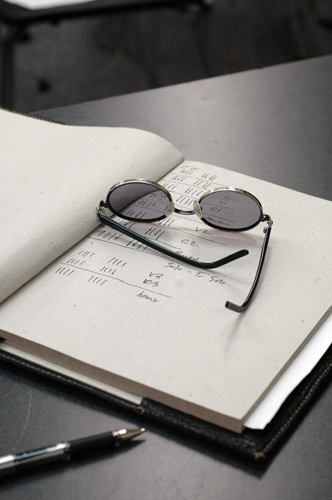
Icons of an iconoclast
Photo Adam Olenn

Drummer Mike Blong lays down the groove
Photo Adam Olenn
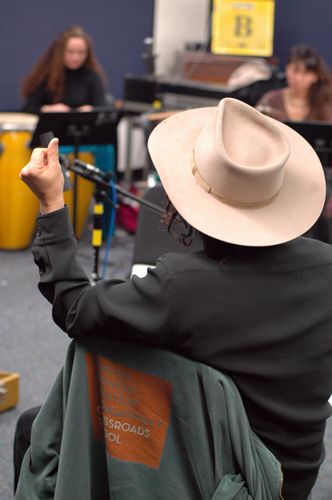
Don Was snaps to the beat
Photo Adam Olenn
For several days in late October and early November, Grammy-winning producer Don Was returned to Berklee to work closely with students. A year ago, he spent all of his time exclusively with student producers. This time, Was is also working with student performers, rehearsing a band that will play a concert of his music tonight at the Berklee Performance Center.
Faculty member and guitarist Marty Walsh, who has been working with Was and the student group, says the show will be loosely based on the expansive and genre-fusing approach of the artist's lesser-known Orquestra Was recording, Forever's a Long, Long Time. Among his goals for that recording were to set compositions in unexpected arrangements—like a hip-hop groove under a country classic—and to find a way to make danceable tunes sound as fresh as possible when performed live.
To do so at Berklee, he formed a core group of nine musicians, playing percussion, drums, keyboard, guitar (including Walsh), and bass (including Was). Horn players, vocalists, and others will join the core group on many tunes.
After one of the rehearsals in ensemble room B-16, Was gushed over the students' playing. "You did a marvelous job," he said. "I'm so excited. I've been on the phone with everybody, saying, 'You're all fired!' This [Berklee] band is it [laughs]."
The following are condensed and edited excerpts of comments Was made to the group during rehearsals.
On finding an original sound
I don't want to do karaoke versions of those songs, because we'll sound like a Top 40 band. It'd be goofy. I want to take those songs and transform them. I've got a rough idea, but I wanted it to be suited to who's playing it. We're going to figure out something based on who's playing that doesn't sound like anything else. And we'll make the songs fit that . . . or we do other songs! [laughs]
I think we should find our way of playing it. This is a group. There's no point in imitating the recording, it's got Herbie Hancock and Terence Blanchard on it. It's got other people playing it. Let's find the way we do something.
On engaging the audience
The goal is to do something no one's heard before. It'll be a successful show—even if only 12 people come to it—if people walk away saying, "Man, I never heard anything like that and I really dig it," That's the highest compliment.
On the difficulties of coordinating music and film
The director had timed the scene out and it was longer than the song. Instead of asking us to play an extra chorus, he asked if we could slow it down 10 beats per minute, which—when you're starting out at 80bpm—it's really really slowing it down. None of the old arrangement things worked, so they cut it and did a sound-alike of the whole thing. It really felt . . . lugubrious doesn't even begin to describe it. That's when I came in. They gave me the track and said, "Do something with this." I felt like going to Nashville, so it's kind of country-ish.
On his values as a producer
When I produce a record, I try to be invisible. I don't want people to recognize that I did it. I think I did a good job when people say, "The singer sings well—that's the best I ever heard her sing." Great, I did my job. When they say, "There are all these clever textures, then I messed up, because they're noticing that instead of the [artist]."
On poorly-considered promotional ideas
[The label] sent us out on a lip-sync tours of discos. They would stop the disco cold, and say "Guess what? Was (Not Was) is here to do the 'Dinosaur' song!" And no one wanted the disco stopped cold, man. We were not wanted, it was a hostile takeover of the disco. And then we had to stand there and pretend to play, but we weren't plugged in. It was awful, man. When I hear ["Walk the Dinosaur"], that's what I think of.
On the power of music to change the world
Khaled was the king of the Algerian rai singers, these young guys in Algeria. Since they weren't singing about religious themes, the Muslims started killing 'em. They all moved to France, and they hate the Algerians in France. So it was going from one rough scene to another. I met him in 1990, and I'd had his records because they get bootlegged all around the world. It's quarter-tone music with synthesizers and 808s [Roland drum machines].
So he got signed to a French record company, and he came to LA and brought his percussionist and his keyboard player, who had a quarter-tone Casio. It was wild. The record company wanted him to sing in French because they had a law in France that said you could only have two hours a week of Arab-language programming on the radio. It effectively kept anyone singing in Arabic from being on the radio, though there were a tremendous number of people there who spoke Arabic. So we cut this song, and the cool thing was that it became so popular—it was the number one record in France—that they repealed the law in 1990. They had to change the law to accommodate phone-in requests, which I thought was great.
Check out Berkleemusic's online production clinic with Was.
